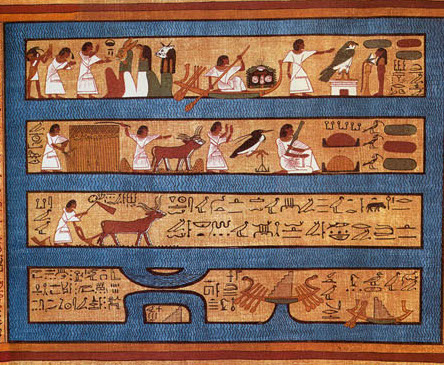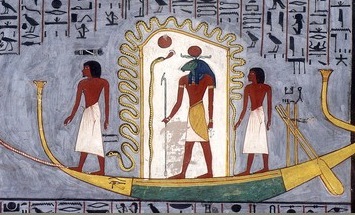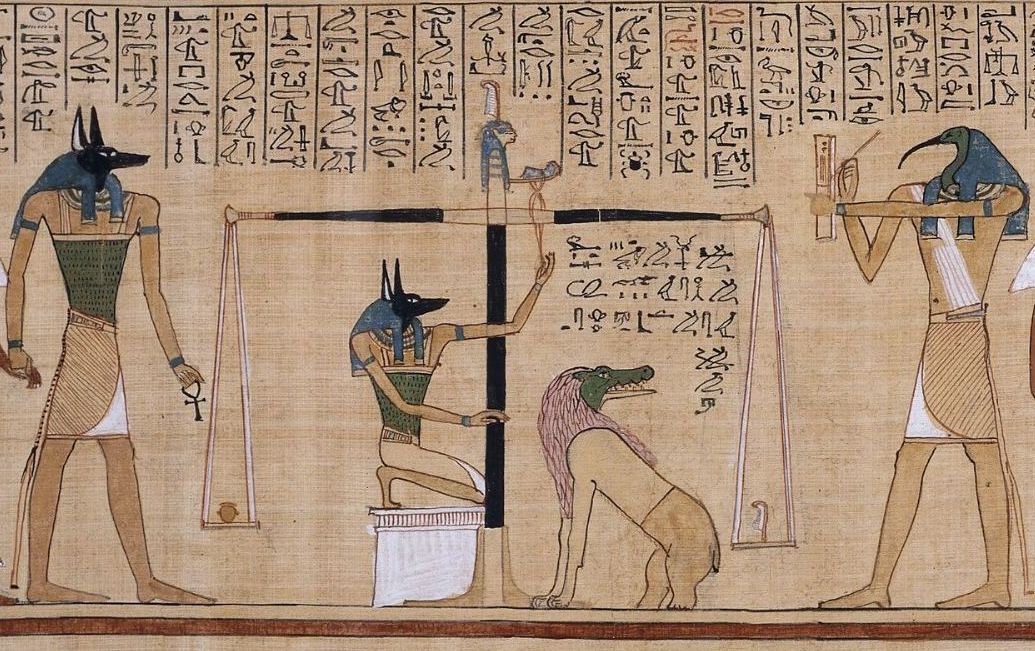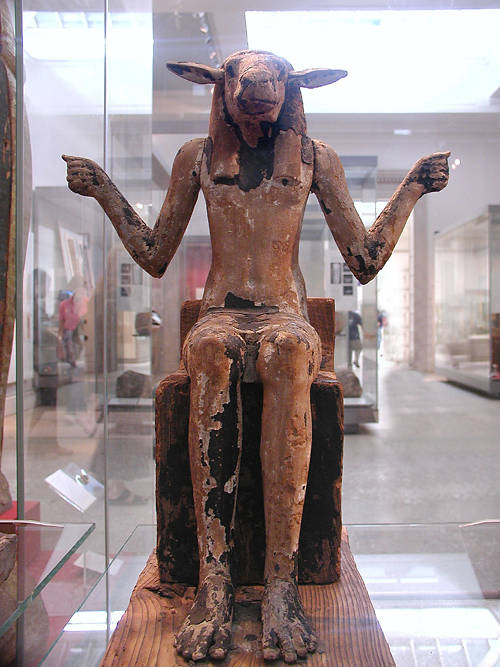|
Aaru
__NOTOC__ In ancient Egyptian mythology, Aaru (; egy, jꜣrw "Reeds, rushes"), known also as '' sḫt-jꜣrw'' or the Field of Reeds, is the heavenly paradise where Osiris rules. It has been described as the '' ka'' (a part of the soul) of the Nile Delta. The ancient Egyptians believed that the soul resides in the heart and so, upon death, the Weighing of the Heart occurred. Each human heart is weighed on a giant scale against an ostrich feather, which represents the concept of Maat. Those souls which balance the scales are allowed to start a long and perilous journey to the Field of Reeds, where they will exist in pleasure for all eternity. Hearts heavy with evil tip and fall into the crocodilian jaws of the demon Ammit. After this "second death", the soul is doomed to restlessness in Duat. The souls who qualify undergo a long journey and face many perils before reaching Aaru. Once they arrive, they enter through a series of gates. The exact number of gates varies accord ... [...More Info...] [...Related Items...] OR: [Wikipedia] [Google] [Baidu] |
Weighing Of The Heart
Ancient Egyptian afterlife beliefs were centered around a variety of complex rituals that were influenced by many aspects of Egyptian culture. Religion was a major contributor, since it was an important social practice that bound all Egyptians together. For instance, many of the Egyptian gods played roles in guiding the souls of the dead through the afterlife. With the evolution of writing, religious ideals were recorded and quickly spread throughout the Egyptian community. The solidification and commencement of these doctrines were formed in the creation of afterlife texts which illustrated and explained what the dead would need to know in order to complete the journey safely. Egyptian religious doctrines included three afterlife ideologies: belief in an underworld, eternal life, and rebirth of the soul. The underworld, also known as the Duat, had only one entrance that could be reached by traveling through the tomb of the deceased. The initial image a soul would be presented ... [...More Info...] [...Related Items...] OR: [Wikipedia] [Google] [Baidu] |
Duat
The Duat ( egy, dwꜣt, Egyptological pronunciation "do-aht", cop, ⲧⲏ, also appearing as ''Tuat'', ''Tuaut'' or ''Akert'', ''Amenthes'', ''Amenti'', or ''Neter-khertet'') is the realm of the dead in ancient Egyptian mythology. It has been represented in hieroglyphs as a star-in-circle: 𓇽. The god Osiris was believed to be the lord of the underworld. He was the first mummy as depicted in the Osiris myth and he personified rebirth and life after death. The underworld was also the residence of various other gods along with Osiris. The geography of the ''Duat'' is similar in outline to the world the Egyptians knew: There are realistic features like rivers, islands, fields, lakes, mounds and caverns, but there were also fantastic lakes of fire, walls of iron, and trees of turquoise. In the ''Book of Two Ways'' (a Coffin Text) there is even a map-like image of the ''Duat''. Resident souls, gods, and demons The ''Duat'' was also a residence for various gods, including Osi ... [...More Info...] [...Related Items...] OR: [Wikipedia] [Google] [Baidu] |
Book Of The Dead
The ''Book of the Dead'' ( egy, 𓂋𓏤𓈒𓈒𓈒𓏌𓏤𓉐𓂋𓏏𓂻𓅓𓉔𓂋𓅱𓇳𓏤, ''rw n(y)w prt m hrw(w)'') is an ancient Egyptian funerary text generally written on papyrus and used from the beginning of the New Kingdom (around 1550 BCE) to around 50 BCE. The original Egyptian name for the text, transliterated ''rw nw prt m hrw'', is translated as ''Book of Coming Forth by Day'' or ''Book of Emerging Forth into the Light''. "Book" is the closest term to describe the loose collection of texts consisting of a number of magic spells intended to assist a dead person's journey through the '' Duat'', or underworld, and into the afterlife and written by many priests over a period of about 1,000 years. Karl Richard Lepsius introduced for these texts the German name ''Todtenbuch'' (modern spelling ''Totenbuch''), translated to English as Book of the Dead. The ''Book of the Dead'', which was placed in the coffin or burial chamber of the deceased, was part of a tr ... [...More Info...] [...Related Items...] OR: [Wikipedia] [Google] [Baidu] |
Maat
Maat or Maʽat ( Egyptian: mꜣꜥt /ˈmuʀʕat/, Coptic: ⲙⲉⲓ) refers to the ancient Egyptian concepts of truth, balance, order, harmony, law, morality, and justice. Ma'at was also the goddess who personified these concepts, and regulated the stars, seasons, and the actions of mortals and the deities who had brought order from chaos at the moment of creation. Her ideological opposite was Isfet (Egyptian '' jzft''), meaning injustice, chaos, violence or to do evil. Pronunciation Cuneiform texts indicate that the word ''m3ˤt'' was pronounced /múʔʕa/ during the New Kingdom of Egypt, having lost the feminine ending ''t''. Vowel assimilation of ''u'' to ''e'' later produced the Coptic word "truth, justice". History The earliest surviving records indicating that Maat is the norm for nature and society, in this world and the next, were recorded during the Old Kingdom of Egypt, the earliest substantial surviving examples being found in the Pyramid Texts of Unas ... [...More Info...] [...Related Items...] OR: [Wikipedia] [Google] [Baidu] |
Elysium
Elysium (, ), otherwise known as the Elysian Fields ( grc, Ἠλύσιον πεδίον, ''Ēlýsion pedíon'') or Elysian Plains, is a conception of the afterlife that developed over time and was maintained by some Greek religious and philosophical sects and cults. It was initially separated from the Greek underworld--the realm of Hades. Only mortals related to the gods and other heroes could be admitted past the river Styx. Later, the conception of who could enter was expanded to include those chosen by the gods, the righteous, and the heroic. They would remain at the Elysian Fields after death, to live a blessed and happy afterlife, and indulge in whatever enjoyment they had enjoyed in life. The Elysian Fields were, according to Homer, located on the western edge of the Earth by the stream of Okeanos. In the time of the Greek poet Hesiod, Elysium would also be known as the "Fortunate Isles", or the "Isles (or Islands) of the Blessed", located in the western ocean at the e ... [...More Info...] [...Related Items...] OR: [Wikipedia] [Google] [Baidu] |
Paradise
In religion, paradise is a place of exceptional happiness and delight. Paradisiacal notions are often laden with pastoral imagery, and may be cosmogonical or eschatological or both, often compared to the miseries of human civilization: in paradise there is only peace, prosperity, and happiness. Paradise is a place of contentment, a land of luxury and fulfillment. Paradise is often described as a "higher place", the holiest place, in contrast to this world, or underworlds such as Hell. In eschatological contexts, paradise is imagined as an abode of the virtuous dead. In Christianity and Islam, Heaven is a paradisiacal relief. In old Egyptian beliefs, the underworld is Aaru, the reed-fields of ideal hunting and fishing grounds where the dead lived after judgment. For the Celts, it was the Fortunate Isle of Mag Mell. For the classical Greeks, the Elysian fields was a paradisiacal land of plenty where the heroic and righteous dead hoped to spend eternity. In Buddhism, paradise and ... [...More Info...] [...Related Items...] OR: [Wikipedia] [Google] [Baidu] |
Osiris
Osiris (, from Egyptian ''wsjr'', cop, ⲟⲩⲥⲓⲣⲉ , ; Phoenician: 𐤀𐤎𐤓, romanized: ʾsr) is the god of fertility, agriculture, the afterlife, the dead, resurrection, life, and vegetation in ancient Egyptian religion. He was classically depicted as a green-skinned deity with a pharaoh's beard, partially mummy-wrapped at the legs, wearing a distinctive atef crown, and holding a symbolic crook and flail. He was one of the first to be associated with the mummy wrap. When his brother, Set cut him up into pieces after killing him, Osiris' wife Isis found all the pieces and wrapped his body up, enabling him to return to life. Osiris was widely worshipped until the decline of ancient Egyptian religion during the rise of Christianity in the Roman Empire. Osiris was at times considered the eldest son of the earth god Geb and the sky goddess Nut, as well as being brother and husband of Isis, and brother of Set, Nephthys, and Horus the Elder, with Horus ... [...More Info...] [...Related Items...] OR: [Wikipedia] [Google] [Baidu] |
Ashihara No Nakatsukuni
is, in Japanese mythology, the world between Takamagahara (Heaven) and Yomi ( Hell). In time, the term became another word for the country or the location of Japan. The term can be used interchangeably with Toyoashihara no Nakatsukuni (豊葦原中国). There is a great dispute among historians about where exactly in Japan the term originally referred to. Perhaps the term was considered appropriate to describe Japan because the land was damp and covered with reeds (葦) in ancient times. The meaning of 中 (middle) in the word 中つ国 is based upon the world view of ancient peoples, where 中つ国 indicates the real world or country between Takamagahara in the heavens and Yomi no kuni in the netherworld. References See also * Upper World (Greek) * Aaru __NOTOC__ In ancient Egyptian mythology, Aaru (; egy, jꜣrw "Reeds, rushes"), known also as '' sḫt-jꜣrw'' or the Field of Reeds, is the heavenly paradise where Osiris rules. It has been described as the '' ... [...More Info...] [...Related Items...] OR: [Wikipedia] [Google] [Baidu] |
Neorxnawang
Neorxnawang (also Neorxenawang and Neorxnawong) is an Old English noun used to translate the Christian concept of paradise in Anglo-Saxon literature.Simek (2007:229). Scholars propose that the noun originally derives from Germanic mythology, referring to a "heavenly meadow" or place without toil or worries.Jeep (2001:554). Etymology While the second half of the word, -''wang'', is widely acknowledged to mean 'field' and its cognate ''waggs'' appears for 'paradise' in Gothic, scholars have come to no agreement on the meaning of the first element of the word, though at least a dozen attempts have been made to interpret it by scholars. Scholar Rudolf Simek states that it is possible to consider the term as a Proto-Germanic term for 'Asgard' or 'Other World' due to the noun's unclear meaning, that Christian authors who used it seemed to have a poor understanding of it as well, and that it corresponds with the North Germanic terms ''Iðavöllr'' (possibly 'field of activity' or 'the cont ... [...More Info...] [...Related Items...] OR: [Wikipedia] [Google] [Baidu] |
Paradise
In religion, paradise is a place of exceptional happiness and delight. Paradisiacal notions are often laden with pastoral imagery, and may be cosmogonical or eschatological or both, often compared to the miseries of human civilization: in paradise there is only peace, prosperity, and happiness. Paradise is a place of contentment, a land of luxury and fulfillment. Paradise is often described as a "higher place", the holiest place, in contrast to this world, or underworlds such as Hell. In eschatological contexts, paradise is imagined as an abode of the virtuous dead. In Christianity and Islam, Heaven is a paradisiacal relief. In old Egyptian beliefs, the underworld is Aaru, the reed-fields of ideal hunting and fishing grounds where the dead lived after judgment. For the Celts, it was the Fortunate Isle of Mag Mell. For the classical Greeks, the Elysian fields was a paradisiacal land of plenty where the heroic and righteous dead hoped to spend eternity. In Buddhism, paradise and ... [...More Info...] [...Related Items...] OR: [Wikipedia] [Google] [Baidu] |
Gate Deities Of The Underworld
The gate deities of the underworld were ancient Egyptian minor Ancient Egyptian deities, deities charged with guarding the gates of the Duat, Egyptian underworld.Hart 1986, pp. 68–72.Wilkinson 2003, pp. 81–2. Description and partition The Egyptians believed that in the Underworld, netherworld, the Duat, there were various gates, doors and Pylon (architecture), pylons crossed every night by the solar boat (Atet) of the Solar deity, sun-god Ra and by the Ancient Egyptian concept of the soul, souls directed to the world of the dead. Ancient funerary texts provide many different descriptions of the afterlife gates. Sometimes more than 1,000 guardian deities are listed. According to a more general view, every gate was guarded by a minor god who allowed access only to the souls capable of pronouncing the secret name of the god himself, as a sort of "password". The walls of many Pharaoh, Pharaonic tombs in the Valley of the Kings are decorated with the texts of the Book of Ga ... [...More Info...] [...Related Items...] OR: [Wikipedia] [Google] [Baidu] |
Conceptions Of Heaven
Conception commonly refers to: * Concept, an abstract idea or a mental symbol * Conception (biology), the process of becoming pregnant, involving fertilization and implantation of the embryo in the uterus Conception may also refer to: Entertainment * ''Conception'' (album), an album by Miles Davis * "Conception" (song), a 1950 jazz standard by George Shearing * ''Conception'', a posthumous album by Bill Evans * Conception (band), a Norwegian band * ''Conception'' (film), a 2011 film * ''Conception'' (video game), a 2012 role-playing video game developed by Spike Maritime * Sinking of MV ''Conception'', a 2019 fire and sinking of a dive boat Places * Conception, Missouri, US * Conception, Minnesota, US * Conception Bay, Newfoundland, Canada * Conception Bay (Namibia) See also * Concept (other) * Concepción (other) Concepción (Spanish for ''conception'') refers to the Immaculate Conception of Mary, mother of Jesus, according to Roman Catholic ... [...More Info...] [...Related Items...] OR: [Wikipedia] [Google] [Baidu] |




.jpg)



